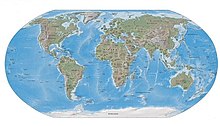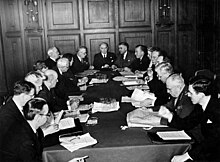Listas de países e territórios
Foram assinalados vários problemas nesta página ou se(c)ção: |
Um país é um território geográfico, tanto no sentido de nação (uma entidade cultural) e estado (uma entidade política).[1]
Quando o termo país é usado como um sinônimo de um Estado soberano independente, veja:
- Lista de estados soberanos
- Estados-membros das Nações Unidas
- As Nações Unidas também lista territórios dependentes (incluindo a Lista das Nações Unidas de territórios não autônomos) e de algumas áreas de especial soberania como entradas separadas em suas listas de países.
Outras listas oficiais[editar | editar código-fonte]
- Lista de códigos de países ISO 3166-2 (ISO)
- Lista de países por código do COI (COI)
- Lista de códigos de país da FIFA (FIFA)
- Lista de domínios da Internet de nível superior
Outros significados de país[editar | editar código-fonte]
Listas temáticas[editar | editar código-fonte]
Demografia[editar | editar código-fonte]

As características da população humana:
- Lista de Estados soberanos e territórios dependentes por taxa de fecundidade
- Lista de países por taxa de natalidade
- Lista de países por índice de mortalidade
- Lista de países por Índice de Desenvolvimento Humano
- Lista de países por população imigrante
- Lista de países por igualdade de riqueza
- Lista de países por índice de mortalidade infantil
- Lista de países por esperança média de vida à nascença
- Lista de países por população
- Lista de países por crescimento populacional
- Lista de países por densidade populacional
- Lista de países por taxa de suicídio
- Lista de países onde o inglês é a língua oficial
- Lista de países onde o português é língua oficial
- Lista de países onde o espanhol é uma língua oficial
- Lista dos países com menos de 100.000 pessoas
Economia[editar | editar código-fonte]
A produção, distribuição e consumo de bens e serviços:
Produto interno bruto[editar | editar código-fonte]
O valor dos bens e serviços produzidos em um país:
- Lista de países por PIB nominal
- Lista de países por PIB nominal per capita
- Lista de países por PIB (Paridade do Poder de Compra)
- Lista de países por PIB (Paridade do Poder de Compra) per capita
Ambientalismo[editar | editar código-fonte]

A química, física e fatores bióticos que atuam sobre um ecossistema:
- Lista de países por emissões de dióxido de carbono
- Lista de países por emissões de dióxido de carbono per capita
- Lista de países por consumo de eletricidade
Geografia[editar | editar código-fonte]

A Terra e suas características:
- Lista de países e territórios por área
- Lista de Estados soberanos e territórios dependentes por continente
- Lista de países por continente (arquivo de dados)
- Lista de países por ponto mais a sul
- Lista de zonas económicas exclusivas por país
Nomes[editar | editar código-fonte]

O rótulo para um país:
- Lista de países que mudaram de nome
- Lista de países por etimologia dos nomes
- Lista de Estados soberanos e territórios dependentes da Europa
Política[editar | editar código-fonte]

O processo pelo qual grupos, muitas vezes os governos, tomar decisões:
- Direitos LGBT no mundo
- Lista de reivindicações de soberania
- Lista de áreas autônomas por país
- Lista de países por sistema de governo
- Lista de governos em exílio
- Lista de chefes de Estado e de governo atuais
- Lista de Estados extintos
- Lista de países por data de independência ou criação
- Lista de disputas territoriais
- Quadro de divisões administrativas por país
Militar[editar | editar código-fonte]
- Índice Global da Paz de 2007
- Lista de países por gastos militares
- Listas de países com armamento nuclear
Esportes[editar | editar código-fonte]
Diversos[editar | editar código-fonte]
- Lista de países por sentido de circulação de tráfego
- Lista de países por consumo de cerveja por pessoa
- Lista de capitais nacionais
- Lista de códigos telefónicos
Ver também[editar | editar código-fonte]
Referências
- ↑ O Oxford English Dictionary (Second Edition, with online updates as of September 2008. Entry "1. country") enumera os seis primeiros como:
- I. 1. a. A tract or expanse of land of undefined extent; a region, district.
- 2. a. A tract or district having more or less definite limits in relation to human occupation. e.g. owned by the same lord or proprietor, or inhabited by people of the same race, dialect, occupation, etc.; spec. preceded by a personal name: the region associated with a particular person or his works; also fig.
- 3. The territory or land of a nation; usually an independent state, or a region once independent and still distinct in race, language, institutions, or historical memories, as England, Scotland, and Ireland, in the United Kingdom, *etc.
- With political changes, what were originally distinct countries have become provinces or districts of one country, and vice versa; the modern tendency being to identify the term with the existing political condition.
- 4. The land of a person's birth, citizenship, residence, etc.; used alike in the wider sense of native land, and in the narrower one of the particular district to which a person belongs.
- 5. a. ‘The parts of a region distant from cities or courts’ (J.); the rural districts as distinct from the town or towns; sometimes applied to all outside the capital, called, by eminence, ‘town’.
- 6. a. The people of a district or state; the nation.


